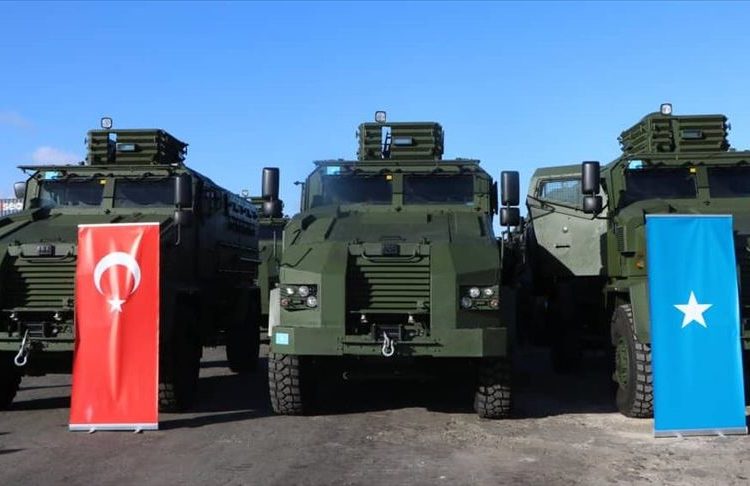Nordic Monitor
Turkey considers the Somali army a guarantor of its presence in the vulnerable and fragile African country and is continuing its assistance by donating military equipment and training army personnel.
Through its military training base and defense industry cooperation, Turkey is aiming to expand its political influence and military involvement in Somalia and the Horn of Africa. In the event of the withdrawal of AMISOM (African Union Mission to Somalia) troops, Turkey will become a dominant actor in shaping the Somali army.
Speaking to Turkey’s state-run Anadolu news agency, Turkish ambassador in Mogadishu Mehmet Yılmaz stated that military cooperation between the two countries is of crucial importance and that Somali officers who had already graduated from Ankara’s military training center will form the backbone of the Somali army.
About one-third of Somali soldiers will have been trained in Turkey, with 2,500 having graduated so far, Yılmaz stressed.
In parallel with the training programs, the Turkish government donated 12 new armored personnel carriers to the Somali military in August. The vehicles will be used by Somalia’s special unit, trained and mentored by the Turkish armed forces, according to local media reports. Somali Defense Minister Hassan Ali Mohamed and the country’s armed forces chief, Gen. Odawa Yusuf Rageh, accepted the donation at a ceremony in Mogadishu.
In 2018 the Turkish government delivered 450 of its domestically manufactured MPT-76 assault rifles to Somalia to fight the al-Shabaab terrorist group.

“When we look at the total numbers, Turkey will have trained one-third of Somali military forces, estimated to be around 15,000-16,000 personnel,” Yılmaz told Anadolu, adding that Somali soldiers first received basic training at the Turkish military base in Somalia before being brought to a commando training center in Turkey’s Isparta province.
He underlined that the withdrawal of AMISOM is under discussion as part of the country’s transition plan and that the number of AMISOM soldiers had recently been reduced by 2,000. According to Yılmaz, AMISOM’s full withdrawal depends on Somalia’s ability to create its own security sources.
AMISOM has grown from an initial deployment of 1,500 Ugandan soldiers in 2007 to a multinational African force. Its military component comprises troops drawn from Uganda, Burundi, Djibouti, Kenya and Ethiopia who are deployed in six sectors covering south and central Somalia. In addition to their military operations against al-Shabaab, the AMISOM troops have been training and equipping Somali soldiers with the objective of gradually handing over security duties in liberated areas to the Somali army.
While AMISOM continues to receive financial, logistical and equipment support from governments and international organisations, a 20 percent reduction in the European Union’s $200 million annual contribution has affected some of its operations.

Turkey set up its biggest overseas military base, Camp TURKSOM, in the Somali capital in 2017, increasing Ankara’s presence to its highest level in the Horn of Africa country. The military training base, which reportedly cost $50 million and is spread over four square kilometers, has the capacity to train at least 1,500 soldiers at a time.
“This is the largest training base of its kind outside of Turkey. … The government of Turkey and its army will provide all the needed support to our brothers in Somalia,” Hulusi Akar, the-then chief of the Turkish general staff and current defense minister, said at the opening ceremony.

Following the collapse of the Siad Barre regime in 1991, the Somali state largely ceased to exist and had no governing authority. Famine and fighting killed approximately 300,000 people in 1991 and 1992, prompting a UN humanitarian mission led by US forces. The intervention soon deteriorated into urban guerrilla warfare with Somali militias. In September 2012 Somalia established a new government and drafted a provisional constitution in an attempt to usher in the country’s first permanent government in more than 20 years.
Bilateral relations between Turkey and Somalia began to develop after President Recep Tayyip Erdoğan’s official visit to Mogadishu in August 2011, when the country was struggling with a drought. The visit constituted a turning point in the Turkish presence in the country. Erdoğan had shown great interest in Somalia at the time, and his associates secured the operating rights of both the airport and port facilities. Turkey also built its biggest diplomatic mission in Mogadishu.












